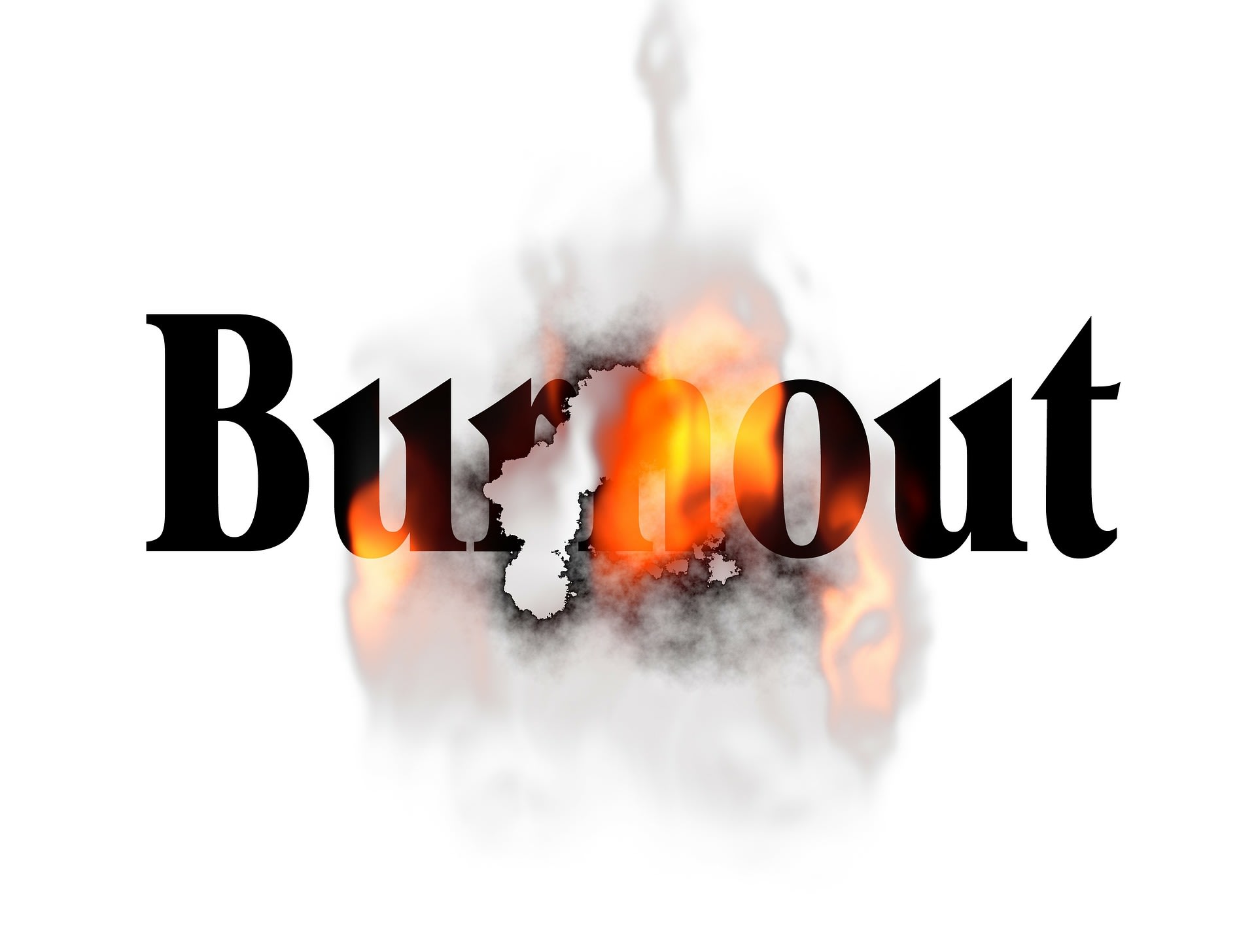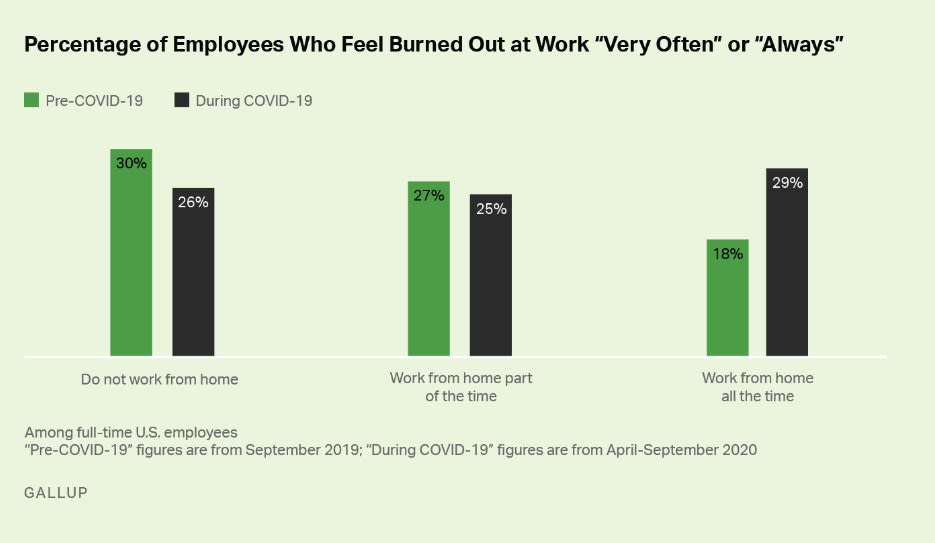5 Warning Signs of a Work-From-Home Burnout & How to Fix That
In this article, we will discover 5 key signs of work-from-home burnout and tell you how to address them in a healthy manner.

More and more people are going remote these days. The combination of several factors, including the widespread digitalization, the COVID-19 pandemic, and the outsourcing trend have made working from home a new reality for millions of people worldwide.
Remote work sure sounds like a perfect alternative to long commutes, rigid working hours, and workplace stress – 80% of employees report they would like to work from home at least some of the time.
And yet, there are hidden dangers behind the perfect work-from-home facade. And professional burnout is one of them. In this article, we will discover 5 key signs of work-from-home burnout and tell you how to address them in a healthy manner.
What is WFH Burnout?
According to WHO, burnout is “a syndrome resulting from workplace stress that has not been successfully managed”. And remote workers are not immune to this condition.
In fact, working from home comes with a number of risks that can lead to burnout:
- The lack of proper time management;
- Various distractions at home;
- The lack of social support;
- Procrastination, etc.
All these factors can throw you off your work-life balance and make remote work a stressful experience. And when stress becomes your norm, that’s when you know you’re burned out.

As of 2020, 29% of permanent remote workers felt burned out very often or always. On top of that, 69% of remote employees were experiencing burnout symptoms episodically – and the number is growing. If you feel you might be one of those people, becoming aware of the signs of remote work burnout is crucial.
Signs Of a WFH Burnout
1. You’re Always Tired
Chronic exhaustion is probably the most tell-tale sign of WFH burnout. This condition occurs due to the constant stress that wears you out physically and mentally.
Besides, there is another hidden factor contributing to remote work-related exhaustion – working long hours. Since at home you don’t have a well-defined work schedule, the temptation to work longer and complete more tasks can actually turn against you.
And if you think only total workaholics fall into this trap, you’re wrong. 65% of remote employees from a 2021 survey reported working more hours than they did in the office.
Chronic exhaustion can disrupt your sleep, mess with your appetite, and even adversely affect your hormonal health. So if you feel that you’re constantly drained, that’s your first red flag.
2. Your Productivity is Suffering
While many remote workers report that their productivity rises compared to the time spent in the office, working from home can have the opposite effect.
You may be unable to
- Complete your tasks on time;
- Keep focusing on your work for long periods of time;
- Avoid making mistakes you wouldn’t normally make;
- Consistently achieve the quality of work you strive for.
This is especially the case with remote employees who have many distractions at home. For instance, if your children are staying at home with you, their presence and need for attention can interfere with your ability to carry out your tasks properly.
Another possible reason for decreased efficiency is on the other extreme. Some remote workers are so absorbed by the working process that they can skip meals, forget to take breaks, and get completely detached from everyday reality. While this might seem like a way to increase productivity and get more things done, remote employees with this work pattern become more prone to making mistakes and losing sharp focus.
3. You’re Not Excited About Your Work Tasks
Another major sign of work-from-home burnout is the consistent lack of enthusiasm for your work.
If you feel like your work is more of a burden than inspiration, that’s the symptom you need to take seriously. This attitude to remote work can lead to chronic apathy, procrastination, and even cynicism toward what you do.
Besides, you might notice that you are gaining a mental distance from your job and gradually losing interest in it.
It is safe to say that this tendency is an alarming one, and if left unaddressed, this sign of the work-from-home burnout can result in depression.
4. You Never Take Proper Time Off
Did you know that 42% of employees still working from home due to COVID-19 are not planning to take any time off to take some rest and recharge?
This is probably one of the biggest traps of remote work – people simply forget what proper time off looks like. Since working from home might seem easier and more relaxed, one thing many remote employees do is neglect the rightfully earned vacation time.
So if you feel like you don’t deserve to take time off because you are better off than office employees, think again.
And it’s not only about a full-on vacation.
Another warning sign of remote work burnout is when an employee refuses to dedicate time to self-care. If you consistently ignore the rituals that normally help you decompress such as taking a hot bath, doing yoga, or even watching some Netflix after a long working day, you risk burying yourself under your work tasks without a chance to take a deep breath and pause for a bit.
5. You Don’t Set Boundaries Between Work and Free Time
One of the hidden dangers of remote work is the absence of actual physical boundaries between a workplace and what you think of as your home. Home is a place to rest, take your mind off of things, and decompress. But when you work remotely, this separation is not so easy to establish – and that’s where you risk burning out.
You’re lucky if you have a separate room that can be made into a proper home office. However, not everyone enjoys this luxury, and sometimes a kitchen table or even your couch can become your desk.
What happens to many remote workers in both situations is that they don’t feel they can disconnect from their professional tasks even if their workday is officially over. For example, if you do things like:
- Checking your work emails while having breakfast;
- Receiving phone calls late in the evenings when you’re supposed to have done your work;
- Not leaving your computer when you’re having a lunch break;
- Looking through your professional team chat before you go to bed, etc, you are on the path to a work-from-home burnout.
How to Prevent and Fix a Work-From-Home Burnout
If you check at least one of the boxes above, it’s time to address the work-from-home burnout problem.
What can you do to get back to a healthy approach to work and enjoy your home office instead of becoming its hostage?
Learn and Practice Stress Relief Techniques
When working from home becomes a stress-infused routine you cannot escape, what you can do is learn to react to it in a different way. That’s where stress relief techniques come in handy. You can choose whatever routines, rituals, or activities that help you get your mind off of work and bring down those cortisol levels. The most common stress relief techniques include:
- Physical exercise (of your choice). 62% of adults who use exercise to manage stress levels report that this technique is highly effective;
- Breathing exercises. Deep breathing is a powerful tool that can calm you down and help you control your emotional reactions;
- Listening to your favorite music;
- Meditation;
- Mindfulness techniques.
Experiment with different techniques and carve out the time for them regularly. Even five minutes of your favorite stress-relief activity a day can go a long way to promote the sense of calm and balance you need to prevent or fight work-from-home burnout.
Establish a Steady Routine
If you don’t want to fall victim to overworking and sacrificing your social life for your home office, having a steady routine is one thing that can help you.
It is not only another way to have a stronger sense of security – a well-established everyday routine will make you a more efficient employee.
The essential components of a quality routine are:
- Going to bed and waking up at the same time. Besides, don’t forget about proper sleep hygiene;
- Planning your meals and eating a healthy diet;
- Scheduling your working hours and break time;
- Setting weakly working goals and mapping out your tasks (to-do’s);
- Carving out the time for family, friends, and social activities.
If you find that your social life is lacking, which tends to happen to all of us who work from home, consider starting something in your business that has a social component to it. For instance, start a Youtube channel or partner with a friend and start a podcast together. Nothing is better than a social activity that also benefits you professionally, so don’t be afraid to give it a shot.
Pro-tip: use digital planners – desktop or mobile apps where you can record your to-do’s, write down plans and appointments, etc. They will help you navigate through the week and reinforce the sense of order both at work and in your time off.
Take Regular Breaks
We cannot stress this enough – take your breaks during the day! You will not burn out if you don’t let yourself overheat.
Having those pockets of free time will increase your attention span and help you maintain focus when you come back to work.
You can take short 5-minute breaks every other hour – be intuitive about it and get up from your desk whenever you feel you need it.
You can use these small breaks to:
- Walk around and stretch – your body will thank you;
- Have a cup of tea or coffee;
- Have a little chat with friends or family. etc.
An extra piece of advice: don’t stay at your computer during lunchtime – eat mindfully and relax a little. The same goes for hungrily scrolling through your social media feeds – this is a source of “cheap” dopamine that doesn’t really help you decompress.

Go on Vacation
Yes, sometimes it’s that simple.
Do not neglect your rightfully earned vacation time and use it to do what you love.
Go to the countryside with your family, spend a week by the seaside with a company of friends – whatever makes you feel happy.
If you can’t get away for vacation – try to make your time home as distanced from work as you can. For a quality home-cation, consider the following tips:
- Put away your laptop or don’t enter your home office;
- Turn off work-related notifications on your phone;
- Read your favorite books and/or watch your favorite content;
- Take up a new hobby or dedicate more time to something you’ve already been doing;
- Visit new places and attend new events in your city.
A good vacation will help you recharge and relieve all the long-accumulated stress from remote work. Besides, time off is a great source of inspiration you can put to use when you come back to your home office.
Ask for Support
Finally, don’t hesitate to ask for help if you feel that work-from-home burnout has caught up with you.
First and foremost, you should be able to get in contact with your employer. Many companies have employee assistance programs that offer workers valuable resources to fight work-from-home burnout. Some employers also run workplace mental health programs – this is another option you can turn to.
Alternatively, you can reach out to:
- Your coworkers. You might be surprised that you’re not alone in your WFH burnout struggle. Talk to your colleagues and share your experiences – an honest conversation alone can be curative;
- Your friends and family. These are people who will listen and empathize with your problems no matter what. And as people distanced from your work environment, they can offer a fresh perspective on how you can fight work-from-home burnout;
- A therapist. Professional advice is very valuable when it comes to mental and emotional health. An experienced therapist will know very well how to deal with the causes and symptoms of work-from-home burnout and can guide you through the process in a gentle, non-invasive way.
Conclusion
Work-from-home burnout is a condition no worker should ignore or take lightly. Observe your behavior and emotions – if you find any of the symptoms on the list coincide with your state, that’s your sign to take action.
Take proper care of your mental well-being – overcoming remote work burnout is crucial to your career, work-life balance, and personal happiness overall.
Snippet for the article: Are you worried you might be burned out from your remote work but don’t know what to do with it? Discover the 5 key symptoms of work-from-home burnout and learn how to cope with them in a healthy way.
Author bio:
David Morneau is the co-founder and CEO of inBeat, a hybrid micro-influencer marketing agency that helps brands scale their marketing efforts. He has helped over 200 DTC brands to date.
